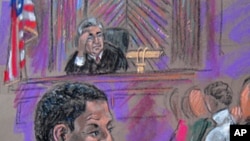A U.S. federal judge in New York has ruled that testimony of a key witness identified as a result of coercion may not be used in the trial of accused terrorist Ahmed Ghailani. Ghailani is the first suspect held in Guantanamo to be tried in an American civilian court.
U.S. Federal Judge Lewis Kaplan has granted a motion by Ahmed Ghailani's defense team to preclude testimony against the defendant by Hussein Abebe. Kaplan agreed that Abebe was identified and located as a direct result of statements made by Ghailani while he was held by the Central Intelligence Agency.
The judge said the conclusion has not been reached lightly, noting "acute awareness of the perilous nature of the world in which we live." But he says, "The Constitution is the rock upon which our nation rests, and it must be followed not only when it is convenient. To do less, would diminish us and undermine the foundation upon which we stand."
The decision is based on the Fifth Amendment to the U.S. Constitution, which says no one shall be compelled in any criminal case to be a witness against himself.
Ghailani's attorney, Peter Quijano, says the defense could not agree more with the court, adding that this case will be tried on lawful evidence, not torture, not coercion.
"For our system of justice, to work, the Fifth Amendment must apply to Ahmed Ghailani as much as to any other defendant before the bar of justice," said Quijano. "It is the Constitution that won a great victory today. We applaud the Court for its courage and support for the law."
Ghailani is accused of terrorism in the 1998 bombings of U.S. embassies in Kenya and his native Tanzania, as well as conspiracy with al-Qaida to kill Americans around the world.
The judge delayed opening of the trial until Tuesday, admonishing about 65 potential jurors not to read, discuss or research anything about the case to make certain they do not become prejudiced about it. The delay allows the government time to reconsider its strategy or to appeal the ruling.
In his remarks to the court, U.S. Assistant Attorney Michael Farbiarz did not indicate how the prosecution will proceed.
The Court had rejected pretrial motions by the defense to dismiss the case altogether on grounds that Ghailani was subjected to prolonged detention and harsh interrogation at the U.S. military prison at Guantanamo Bay, Cuba. Ghailani was apparently forced to divulge Abebe's identity while in confinement with terrorists linked to the September 11, 2001 attacks.
Matthew Waxman, a Columbia University associate law professor and Senior Fellow at the Council on Foreign Relations, says the prosecution may have enough evidence to convict even without Abebe's testimony.
"That is certainly the hope of the prosecutors that they can rely as much as possible, if not exclusively, on pre 9/11 evidence," said Waxman. "And now that this case has gone through some pre-trial rulings, it really does boil down to evidence."
The defendant entered the courtroom without handcuffs, dressed in a maroon shirt, a tie and gray pullover. He appeared to have a relaxed smile and animated discussions with his attorneys.
Judge Kaplan noted Ghailani faces the possibility of life imprisonment, if convicted. He said the defendant's status as an enemy combatant could permit his detention in a status similar to a prisoner of war until hostilities between the United States, al Qaida and the Taliban end, even if he were found not guilty.
US Constitutional Protection Given to Foreign Terror Suspect




